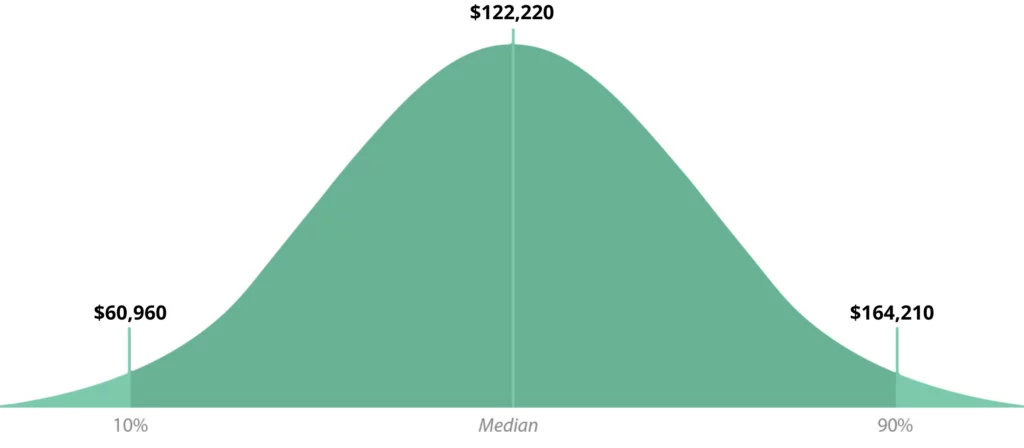
1. Overview: Job Responsibilities, Salary, and Common Requirements
2. A Comprehensive Guide to Becoming a Political Scientist
3. What Does a Political Scientist Do?
4. Signs You Should Consider Becoming a Political Scientist
5. How Do You Become a Political Scientist?
6. What are the Knowledge and Skills Needed to be a Political Scientist?
7. Popular Schools and Colleges in the U.S. for Aspiring Political Scientists
8. Scholarships for Political Science Study Programs
9. How to Get a Job as a Political Scientist
10. Learn About Geographic and Location Pay Differentials
11. Make Your Resume Stand Out
Political Scientists made a median salary of $122,220 in 2019. The best-paid 10 percent made $164,210 that year, while the lowest-paid 10 percent made $60,960.

Anthropologists and Archeologists
Economists
Geographers
Historians
Policy Analyst
Postsecondary Teachers
Sociologists
Survey Researchers
Urban and Regional Planners
Law and Government
Research writing
Analytical skills
Communication
Problem-solving
Logical reasoning
Decision-making
Creativity
History and Archeology
Sociology and Anthropology
Political Theory
Political scientists are social scientists who study political behaviors impacting the federal government. They specialize in various aspects of politics to understand how policies and laws affect the government, economy, and citizens. Serving as part researchers, part analysts, and part forecasters, political scientists, have a lot of things on their plate.
The job growth for political scientists is expected to increase by up to 6% in ten years in the United States, according to the Bureau of Labor Statistics (BLS). That is as fast as the average for all other occupations. If you have always been interested in becoming a political analyst, now’s the time to pursue it.
Political scientists conduct in-depth studies about the origin, development, and operation of political systems. They analyze the federal government structure, operations, and its entities. Also, political scientists may utilize the use of public polls, surveys, election results, and other public documents to their analysis.
The typical duties of a political scientist include the following:
To become a political scientist, you will have to undergo a painstakingly long process of education and experience. Well, how do you know you can survive all these to land success in this career? You have to evaluate your capacity to know if you fit the role. Here are some telling signs that show you can thrive in this career:
Have you been interested in politics for the longest time you know? You care about the government so much that you always find yourself dissecting the latest political issues. This is the first sign to knowing you can carve a career in the field as you are engrossed in the whole aspect of political systems.
Are you always on the lookout for the political issues that impact the whole country? If so, that’s a strong demonstration of how much you seek to understand the political aspects of things. As someone looking to make a career out of political science, your responsibilities heavily deal with government issues and engagements.
Having shown your love for politics, people around you may have come up to you and asked some political opinions. They trust your guts because they know you are fully aware of the ins and outs of politics.
Do you frequently get questions about running for office? You might have plans for that, but the common denominator of entering the world of politics lies there. You are being asked because you display great intentions of improving the political systems. That trait will land you places in this field.
One of the common projects a political scientist does is writing research that deals with the current government, economy, and social trends. If you are capable of writing such in-depth studies, you can expect a good career turnout. Writing is one of the fundamental responsibilities you need to fulfill in order to be successful in being a political scientist.
A huge chunk of your responsibilities will fall under the umbrella of research. You need to conduct tons of research to come up with conclusions, evaluations, and data analysis. Political scientists frequently conduct research, and you have to be adept at it. You can totally nail this job with those excellent research skills.
A handful of those research you will do is based on past happenings. You will be looking into various issues that have impacted the current trends in order to forecast the next political trends. If you are one who takes pleasure in diving deep in history, you can expect an exciting job ahead of yours.
To qualify as a political scientist, you will undergo several years of education and experience working in the field. You must be dedicated to striving to expand your knowledge as the discipline demands it. And if you have never had a problem studying various subjects, you will enjoy a job as a political scientist.

When pursuing a career as a political scientist, you have to go through a series of requirements before you qualify for the role. To know how you can land the coveted role, here’s a breakdown of what you need to complete:
You can score an entry-level career that can advance to being a political scientist when you have completed a 4-year degree in Political Science. The degree provides a good foundation for those who want to pursue a career in the government and education sector. It offers a good background for Politics, Public Administration, Research, and Journalism, which are all essential upon advancing to the field.
These are required to initially land a political scientist role. Having a master’s degree demonstrates advanced knowledge in several disciplines. You have the option to choose the area of interest you want to pursue. The common courses include research methods, policy formation, program evaluation, and statistics.
Before applying for a doctorate program, you will have to consider taking related internships and volunteer work. These will provide you a higher chance of getting accepted.
Most political scientists have a Ph.D. under their belt. Ph.D. holders specialize in one of the four primary subfields of political science, which include national politics, comparative politics, international relations, and political theory. A Ph.D. program gives you more opportunities than non-holders of a Ph.D.
To be successful in this career, you will need to instill the knowledge and skills that make a political scientist competent. These are those qualities that make one thrive in this career:
Political scientists often conduct both qualitative and quantitative research to find out underlying issues and particular effects of public policies. You have to be highly analytical in terms of the whole process, which includes collecting, assessing, and interpreting data to come up with conclusions.
For every profession there is, communication skills always play a vital role in fulfilling duties. To be more precise, you will be working with several other researchers when conducting studies and writing reports, so you need to develop a good relationship with them. Also, you will have the task of disseminating your findings through presentations and reports, which will require you to speak to an audience.
Not necessarily in an artistic way, but political scientists have the responsibility of finding new ideas to explore in terms of research. You must be up to date with the latest political subjects to identify new topics you can take a look into.
Political scientists are critical thinkers. They make use of their sharp critical thinking skills to fulfill their duties. Considering the fact that political scientists handle a handful of studies, you have to make use of logical reasoning to draw up conclusions.
Your ability to combine pieces of information to form conclusions is vital in your research. Without the sharp eye for seeing relationships among unrelated points, you cannot conclude a study.
The foundation of subjects you are going to study, knowledge in government in the law and government is essential. As you have acquired years of education, you are expected to be familiar with the laws, legal codes, court procedures, precedents, government regulations, executive orders, and democratic political process.
The knowledge in history provides an advantageous point in being a political scientist. You will need to look back on the past to evaluate the past political trends and previous issues that affected the current political happenings.
Political science is a branch of social sciences. You need to be knowledgeable in group behavior and dynamics, the social trends and influences, and the history of humans and their origins.
Find out 2021’s best universities that offer a degree in Political Science in this list by College Factual:
If you are keen on applying for a scholarship with Political Science as your major, you are in luck as there are tons of programs to choose from. Here’s a list of the Political Science scholarships you can take in the United States in your journey to become a political scientist.

So, where do you find a job as a political scientist? Most political scientists who have Ph.D. are working as professors at universities, while all that are left work for the government, businesses, research firms, and more. To help you find your next career opportunity, here are some ways to guide you:
If you are interested in teaching as a profession, you can ask your professors or previous teachers for a referral. Teaching Political Science or Public Administration is a good choice for a political scientist like you. There is a high probability that you can find a job through personal connections like your previous professors who can attest to your expertise.
One of the best resources for a career opportunity is a professional journal that relates to your field. This kind of publication includes various job listings related to your field. Keep up to date with these journals to find a good career that suits your interests.
Your LinkedIn account serves as an effective way to source job opportunities. Add your personal connections that include your previous professors, co-workers, mentors, and other professional acquaintances to keep tabs on them. Also, remember to keep your profile updated for a chance to attract recruiters who can directly offer you career opportunities.
You can also directly inquire to your preferred companies or firms to find out any job vacancy. You can check out their online job listings or call their office for any opportunity that can be yours.
The most convenient way to find a job is by browsing through online job portals. These platforms offer you a wide array of options that are just a click away from you. You can check out these popular online job portals to help you find your next job:
Earning an average of $122,220 annually, political scientists receive quite impressive pay. But wages still differ based on the area you are in. Here is a list of states that have released data about the annual mean wage of political scientists working in their area:
| State | 2019 Mean Annual Wage |
|---|---|
| Virginia | $130,070 |
| New York | $127,660 |
| District of Columbia | $123,940 |
| Massachusetts | $109,060 |
| Pennsylvania | $106,590 |
| Washington | $99,040 |
| State | 2019 Mean Annual Wage |
|---|---|
| Florida | $98,710 |
| Arizona | $98,510 |
| Texas | $89,310 |
| California | $79,600 |
| Maine | $76,790 |
| Illinois | $71,920 |
Report from the Bureau of Labor Statistics
A well-crafted resume increases your chance of getting hired. Make sure you put some effort into writing your resume. It is the first thing that potential employers see after all. Boost your employability by striking a good impression through a polished resume.
Here are some helpful tips for creating an impressive resume:
A neat-looking resume is more enticing to look at rather than a cluttered resume that screams “boring.” Keep everything concise but sweet enough to allure the employers of what you have in store for them. Do not have a full-blown summary of what you did; instead, put items in bullet form to prove a point. You will just have to provide additional support to the interview.
A career objective is one of the essential parts of your resume. Your potential employer wants to know what your career outlook in life is, so ensure you place one that speaks your vision. Keep it brief but well-stocked with the information that includes your plans in the coming years.
One of the best assets you can showcase in your resume is the number of studies you have done in the past. You are more likely to have published a few of your writings, and this gives you an advantage if you list them down on your resume.
You have spent an ample amount of time specializing in the area of interest you are in. Make that count and highlight your educational background to demonstrate your knowledge in the field.
The professional associations you are in give you a boost whenever you apply for a job. This displays your perseverance to explore the field and build connections for career growth. Ensure you put them in to receive that extra points.
Here are some of the professional associations you can include on your resume:
And you are down to the last step on securing your dream job! Make sure you are more than prepared when you come in for an interview with your potential employers. Review ahead and get familiar with the questions that may be asked to you.
To help you get acquainted with the common questions asked to political scientists, here are a few of those and the proper way to answer them:
This is a question to test your adeptness in both research methods. You are expected to be good at both as you are often doing various studies over the course of time you are working.
Answer this question by stating which method you have more experience doing. However, it is important not to steer clear of the other method you did not mention. Instead, you should elaborate on how both research methods are important in fulfilling your job, so you don’t see any problem working on both research methods.
A huge part of your job is making presentations for your findings. You will have to share it with stakeholders, politicians, the public, or the media. You have the responsibility of breaking down complexities into understandable pieces of information.
Share an experience that shows you were able to conquer an instance that involves presenting research. Describe how you ensured everything is laid out in a simple manner for ease of understanding.
As someone who specializes in the realm of politics, you should always be up-to-date with the current events and happenings that concern the government, policies, and its impact on the state and citizens. The employer wants to know how you keep yourself abreast of this information as they are vital in your job.
Provide an answer that enumerates your various platforms to source out news and updates in the latest political engagements of the country. Don’t forget to add your continuous learnings from the history which impact the current and future trends in the political sector.
This is a question to test your data analysis skills. As you are dealing with several pieces of research on your plate, you need to develop a good set of analytical skills. You are to follow the process of gathering, evaluating, and interpreting data to come up with your findings. You will also have to formulate political theories and test them to prove them successfully.
This is the employer wanting to know more about your published studies. Share your whole experience from finding the concept, collecting data, getting the findings, writing the whole thing, publishing it, and presenting it to the bigger mass. Be able to provide how it was received by the public and those who took benefits from it.
Sharpen your skills in political science by taking these top online courses
Check out these courses from Skill Success to help you jump start your career as a political scientist.



